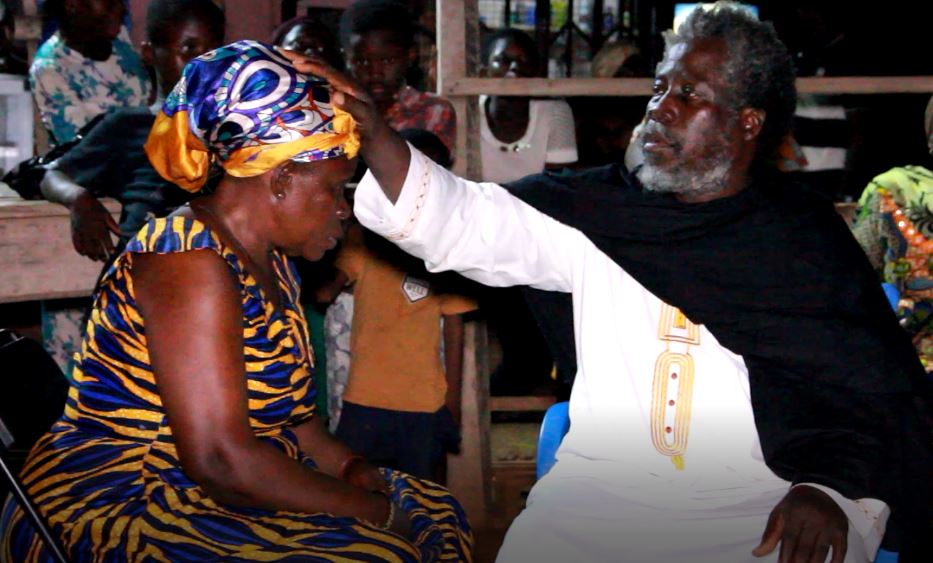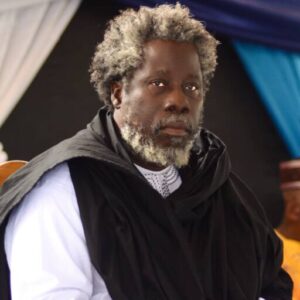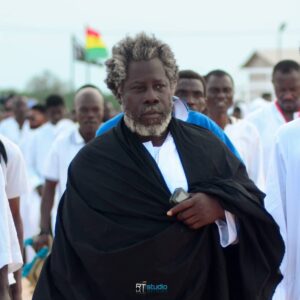
Ɔkrɔnkrɔnyi Nyame Somafo Yawoh and the Tum Mpaebɔ
Written by Mensah Adinkrah, Ph.D.
Introduction
The current essay examines Tum Mpaebɔ, a formidable spiritual arsenal employed by Ɔkrɔnkrɔnyi Nyame Somafo Yawoh to expel evil spirits. However, a comprehensive understanding of this phenomenon necessitates situating it within the broader context of Ɔkrɔnkrɔnyi Nyame Somafo Yawoh’s divine mission as an Elijah and the Messiah of the End Times. His mandate from RABBI encompasses not only the eradication of malevolent forces but also the spiritual restoration of Ghana as the epicenter of the Third Religion of the Most High God.
Ɔkrɔnkrɔnyi Nyame Somafo Yawoh as the Messiah of the Akans
The Most High God, RABBI, has chosen three nations into which He has implanted—or plans to implant—His Religion. These nations are Israel, Saudi Arabia, and Ghana. A God-chosen nation is one where the people collectively worship the Most High God RABBI. In such nations, the culture and daily lives of the people revolve around the Religion, with the worship of the Most High God being paramount. Israel and Saudi Arabia currently fulfill this role as God-worshipping nations. Ghana, however, though chosen by the Most High God RABBI to become a God-worshipping nation, has not yet reached this status.
The Origin of the Akans and God’s Promise
The Akans, believed to be the first inhabitants of Ghana, originally lived in Assyria. The Most High God chose AKAN, an Elijah, as the first Prophet in the world after the floods of Noah. AKAN fathered eighteen sons, each of whom also became a prophet of God. God revealed to AKAN the 17th that He had prepared a Promised Land for him and his people in Ghana, West Africa. AKAN the 17th shared this revelation with his younger brother, Akan the 18th. However, before they could begin their journey, Akan the 17th passed away. After his death, AKAN the 18th assumed leadership and led the Akans on their migration from Assyria to Ghana. Along the way, they stopped in Eastern Africa, where they encountered some of their brethren and stayed for approximately 1,000 years. They later resumed their journey, eventually reaching Central Africa, where AKAN the 18th died.
The Spiritual Shift
AKAN the 18th had been the spiritual leader and intermediary between the Akans and the Most High God RABBI. After his death, the people experienced a spiritual vacuum, losing the structure and mechanics of their religion. In their search for guidance, the leaders consulted spiritualists in the land they were passing through. One such spiritualist provided them with water called Akor, promising protection from premature deaths and blessings for children. However, this pact required that, upon reaching the Promised Land, the Akans place the water in front of their lineage houses and make annual offerings to it. When they eventually arrived in present-day Tekyiman, Ghana, they recognized it as the Promised Land. The various lineages then branched out to establish settlements. However, by honoring their pact with the spiritualist, they had replaced the true worship of the Most High God with idol worship.
The various groups that branched off and settled in different parts of the Promised Land became the dominant Akan subgroups, including the Fante, Asante, Akim, Assin, Kwahu, Akwapim, Ahafo, and Brong. Ɔkrɔnkrɔnyi Nyame Somafo Yawoh is a direct descendant of the Akan group that settled in Fanteland. He traces his lineage to Nana Kwaw Otu, the renowned Fante leader, who is himself a direct descendant of AKAN the Prophet—the first prophet to emerge on earth after the floods of Noah. This group, led by Nana Kwaw Otu, was unique because it was the only group that did not engage in idol worship.
The Influence of Foreign Religions
The arrival of European missionaries in Ghana introduced Christianity, which Ɔkrɔnkrɔnyi Nyame Somafo Yawoh describes as another form of idol worship. Christianity, with its focus on the Trinity, is described as rooted in European idol worship practices that predate Jesus Christ by 700 years. At the time Ɔkrɔnkrɔnyi Nyame Somafo Yawoh emerged on the Ghanaian religious scene, Christianity had spread to nearly every corner of the country, firmly establishing itself as the dominant religion. According to the most recent Ghanaian census data, approximately 71% of the population identifies as Christian, with belief in the Trinity widely upheld as church doctrine. Muslims constitute about 20% of the population. However, according to Ɔkrɔnkrɔnyi Nyame Somafo Yawoh, a significant proportion of Muslims in the country had compromised the purity of Islamic practice by adopting talismans and other practices contrary to the core tenets of Islam.
Redemption and the Mission of Ɔkrɔnkrɔnyi Nyame Somafo Yawoh
According to Ɔkrɔnkrɔnyi Nyame Somafo Yawoh, as a God-chosen nation, Ghana was destined for redemption. In His compassion, the Most High God RABBI decided to liberate the Akan people from idol worship and other satanic practices. To accomplish this, He sent His Messenger, Ɔkrɔnkrɔnyi Nyame Somafo Yawoh, to the Akans of Ghana to free them from the clutches of Satan.
In 2009, the Most High God RABBI instructed Ɔkrɔnkrɔnyi Nyame Somafo Yawoh to rid the nation Ghana of evil spirits and unite Muslims and Christians in worshiping Him. God declared that, for nearly 1,000 years since Ghana’s establishment, no form of worship within the society had been acceptable to Him. Through Ɔkrɔnkrɔnyi Nyame Somafo Yawoh’s mission, the Most High God aims to restore Ghana to its rightful place as a God-worshipping nation.
Tum Mpaebɔ: A Powerful Arsenal in the Exorcism of Evil Spirits
Ɔkrɔnkrɔnyi Nyame Somafo Yawoh, a Messenger of God and an Elijah, is the Messiah of the end times. One of His core divine missions is to exterminate all evil spirits inhabiting the land of Ghana as a precursor to establishing the Third Religion of the Most High God. Nyame Somafo Yawoh draws a compelling parallel between His divine assignment from RABBI to expel all evil spirits from Ghana—designated as the headquarters of this new religion—and the mission of Prophet Mohammed (Peace Be Upon Him). He asserts that just as the Prophet Mohammed arrived in Arabia at a time when idolatry dominated the land, and subsequently eradicated these practices before establishing Islam as a religion, so too is he tasked with purging Ghana of evil spirits as a prelude to instituting the Third Religion of the Most High God. To support this mission, Nyame Somafo Yawoh has introduced Tum Mpaebɔ, a groundbreaking spiritual phenomenon within the framework of Asomdwee Ntonton Som. Tum Mpaebɔ is a unique and powerful spiritual practice that has been introduced only to Ghana. It is unparalleled in its form, methodology, and potency.
Ɔkrɔnkrɔnyi Nyame Somafo Yawoh emphasizes that Tum Mpaebɔ is not merely a religious practice, but a powerful spiritual tool designed to extirpate malevolent forces, paving the way for the nation’s spiritual renewal and alignment with RABBI’s will. Through the implementation of Tum Mpaebɔ, He advances his mission to purify Ghana, establishing it as a sacred stronghold for the new faith and a model for the world. Ɔkrɔnkrɔnyi Nyame Somafo Yawoh describes Tum Mpaebɔ as “Obonsam akyiwade,” (something that Satan finds detestable) meaning a practice that drives away evil. Ɔkrɔnkrɔnyi Nyame Somafo Yawoh asserts that while laying his hands on individuals may sometimes fail to expel a tormenting spirit, having the tormented individual participate in the Tum Mpaebɔ ensures that the spirit is commanded to leave and must obey.
The Wider Impact of Tum Mpaebɔ
The Tum Mpaebɔ has influence beyond the individuals directly participating in the ritual and the spirits inhabiting them. Ɔkrɔnkrɔnyi Nyame Somafo Yawoh asserts that during the Tum Mpaebɔ, His commands possess the power to summon or banish all evil spirits within a 7-mile radius. Upon issuing these commands, the spirits are rendered powerless, their potency neutralized entirely.
Educating the People About RABBI
A crucial component of Ɔkrɔnkrɔnyi Nyame Somafo Yawoh’s mission is educating the people about RABBI. He has disclosed that RABBI directed him to commence the dissemination of the message of the Asomdwee Ntonton Som within the Akan-speaking regions before extending it to non-Akan-speaking areas. This educational endeavor seeks to illuminate the true path to God and instruct the people on the proper way to worship RABBI. In 2022, Ɔkrɔnkrɔnyi Nyame Somafo Yawoh initiated this mission, traveling extensively across the Brong Ahafo, Ashanti, Central, and Eastern Regions of Ghana. During these visits, He teaches the people about RABBI, drives out evil spirits, and brings healing to their lives. His core teachings emphasize that RABBI is one, that He, Ɔkrɔnkrɔnyi Nyame Somafo Yawoh, is God’s messenger, and that exaltation is the preferred mode of worship. At the conclusion of each educational session, He conducts a Tum Mpaebɔ session to solidify the spiritual purification and healing.
The Tum Mpaebɔ Session
The Tum Mpaebɔ begins with a song led by Ɔkrɔnkrɔnyi Nyame Somafo Yawoh’s entourage, with the gathered participants joining in. Upon entering, Nyame Somafo Yawoh offers thanks to the Most High God, RABBI, and prays for mercy, healing, and restoration for the assembled people, all to RABBI’s honor and glory. Ɔkrɔnkrɔnyi Nyame Somafo Yawoh then commands all evil spirits to appear, whether they reside in the sea, the air, on earth, or beneath the earth, and orders them to leave. With each command, the people respond with a resounding “Amen.” The process of exorcism is striking, as individuals are visibly freed from the influence of evil spirits. According to Ɔkrɔnkrɔnyi Nyame Somafo Yawoh, while many spirits depart immediately, some resist and challenge the command. These stubborn spirits may demand to speak and reveal the reasons behind their affliction of the victim before they finally leave. Through the Tum Mpaebɔ, Ɔkrɔnkrɔnyi Nyame Somafo Yawoh conducts a powerful exorcism that purifies both the land and its people, fulfilling his divine mission to eradicate evil and establish the true worship of RABBI.



